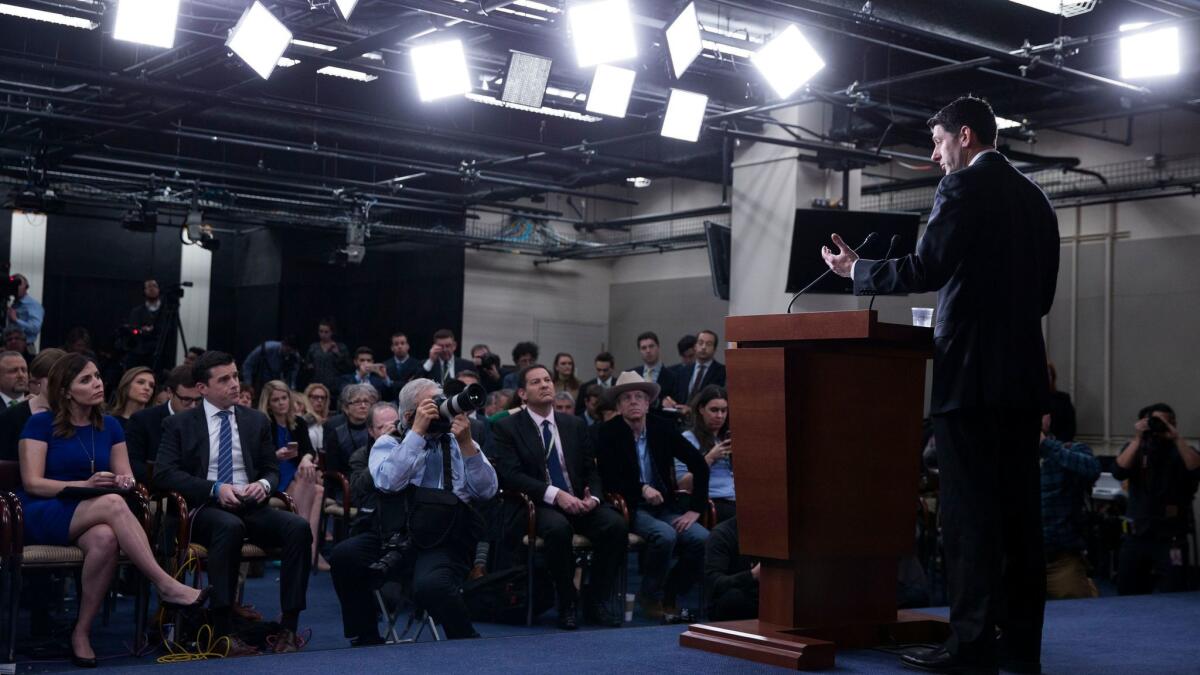Editorial: Trump discovers that legislating is complicated as the GOP healthcare bill goes down in flames

Having recently learned that healthcare is complicated, President Trump has now discovered that legislating is complicated too.
Trump’s attempt to force a half-baked bill to “repeal and replace” Obamacare down the throats of reluctant House Republicans failed, as House leaders were simply unable to satisfy the conflicting demands from the two wings of their party. In the end, it wasn’t a case of savvy dealmakers coming up with an offer that buyers couldn’t refuse; it was a case of buyers looking at the offer and saying, “No thanks.”
Trump eagerly pivoted Friday to the next item on his agenda, rewriting the tax code, which he may already know is complicated as well. But there are at least three questions that linger in the air to haunt the GOP.
First, can the Republicans govern? After voting dozens of times on symbolic measures to repeal the 2010 Patient Protection and Affordable Care Act that they knew would be blocked by a Democratic filibuster in the Senate or a veto by then-President Obama, they started their latest effort facing neither of those roadblocks. Yet once again, the fractious party — and particularly its far-right Freedom Caucus, which could not be satisfied by House Speaker Paul Ryan (R-Wis.) or Trump — could not coalesce behind a major piece of legislation.
Second, having railed about how Obamacare was hurting their constituents, will Republicans now do nothing about the problems some states are experiencing? Californians have been shielded to some degree by the state’s aggressive efforts to make the law work, but the plans offered in the Obamacare exchanges to those not covered by large employer plans have stretched the budgets of some middle-income consumers. And in some states — especially those that have implemented the law poorly — the exchanges have seen sharp premium increases and dwindling competition.
There are a number of things Congress and the administration could do to improve matters, if they were willing to focus on mending the law’s flaws instead of erasing it from the statute books to score political points. And Democrats would be eager to help on that front. But Trump suggested Friday that he’ll wait to talk to Democrats until “after this mess known as Obamacare explodes.” (Other Republicans are not willing to bide their time. For example, Sen. Lamar Alexander of Tennessee, citing problems with his state’s Obamacare exchange, urged the Senate on Friday to keep working on the issue despite the House’s failure.)
Remember, it wasn’t as if Democrats refused to work with Republicans on this issue. It was Republicans who wouldn’t even let Democrats see the bill they were working on until it was filed. That’s a fundamental difference between the lengthy process that resulted in the ACA and the pell-mell rush to vote on the House GOP leadership’s bill.
Third, what does this fiasco tell congressional Republicans about Trump’s ability to deliver on his agenda? Tax cuts may be easy, but Trump has said repeatedly that he wants more — he wants to overhaul the tax code to make it simpler and broader. That inevitably means creating winners and losers, which members of Congress are loath to do. The alternative is just to slash rates and watch the federal budget deficit skyrocket, something the Freedom Caucus theoretically would be opposed to as well.
If only this presidential thing was as easy as it seemed last year. On the plus side, the death of the House healthcare bill means the public has dodged a measure that would have made it harder for lower-income Americans, older citizens and people with preexisting conditions to find affordable coverage. The Congressional Budget Office estimated that the original version of the bill would have left 24 million more people uninsured by 2026, and the changes Ryan offered in an attempt to win votes from the Freedom Caucus may only have caused that number to rise.
Although the House measure was enthusiastically endorsed by Trump and Health and Human Services Secretary Tom Price, whose previous House bills helped shape the current measure, the president never had an actual proposal for healthcare reform. What he hopes to see, he said, is for Democrats to get together with Republicans and produce “a real healthcare bill.” Amen to that.
Follow the Opinion section on Twitter @latimesopinionand Facebook
MORE FROM OPINION
It turns out Donald Trump is not an Artist of the Deal
Pretty much the only thing Trump’s border wall will block is common sense
It’s not Neil Gorsuch’s fault, but we can’t support his ascension to a stolen Supreme Court seat
More to Read
A cure for the common opinion
Get thought-provoking perspectives with our weekly newsletter.
You may occasionally receive promotional content from the Los Angeles Times.










